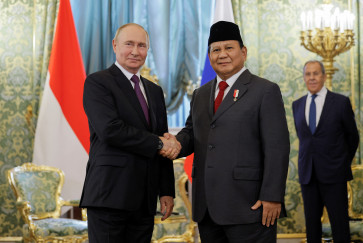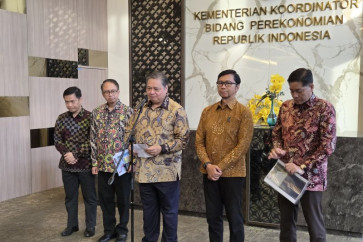Popular Reads
Top Results
Can't find what you're looking for?
View all search resultsPopular Reads
Top Results
Can't find what you're looking for?
View all search resultsTranshumanism: men, animals and machines
Sometimes I wonder if we humans are really better than animals or machines
Change text size
Gift Premium Articles
to Anyone

S
ometimes I wonder if we humans are really better than animals or machines. While watching the news on TV or reading the newspaper, I often come across beastlike men who are inferior to animals and machines. For example, there are those who brutally murder their own wives to collect insurance money or sexually abuse their own daughters for pleasure. Neither animals nor machines commit such hideous crimes. Cruelty is the domain of humans.
We condemn these humans, comparing them to animals. For instance, we use the word 'dog' as an insult for these subhuman people. However, canine lovers would immediately protest, saying, 'Don't insult dogs. Unlike men who frequently betray others, dogs are incredibly loyal to their masters.'
We criticise politicians who frivolously switch party loyalties, calling them 'migratory birds.' Some time ago, ornithologists protested, saying, 'Don't insult migratory birds. They migrate in order to survive. Politicians do it in order to gain political power.'
In Korea, we call a sexual assaulter a 'wolf.' In fact, however, wolves are anything but sexual predators. Instead, they are famous for being monogamous and mating for life.
We also assume that humans are better than machines. Machines, however, are often much more reliable and faithful than men. Robots, for example, will never neglect their duties and assignments. A humanoid husband will never cheat on his wife and an android father will always play with his children and protect them. If they are made of flesh and blood and look human, they may be better than unreliable human husbands and fathers. Take Hollywood movies, for example. A cyborg commits suicide to preserve human civilisation in 'Terminator 2,' while another cyborg volunteers to donate his heart to a dying man in 'Terminator Salvation.' Indeed, machines are often better than men.
We may believe that animals or machines cannot match humans when it comes to intelligence or emotions. Once again, we may be wrong. Experts assert that animals, too, have sensitive and sophisticated feelings and robots can possess astonishing intelligence.
Indeed, AI technology succeeded in creating a robot whose intelligence almost equals that of humans. In Japan, for example, a robot was smart enough to take the entrance exam to the University of Tokyo even though he failed, while another went to space and described what it saw and how it felt there on its return. In Isaac Asimov's 'The Bicentennial Man,' an android called Andrew develops intelligence and emotion, and finally transforms into a human and falls in love with a girl. In the novel, Andrew is better than any human being in many respects.
In fact, we depend heavily on animals and machines. It is undeniable that our life would be bleak if we did not have pets and computers, both of which have become our lifetime companions.
In today's Korean society, pets are beloved family members, with as many as 1 million families raising them, while computers are indispensable and ubiquitous. Forty million among our 50-million-strong population are smartphone users. That means, virtually everybody owns a smartphone in Korea, including elementary school children. Besides, many people today live with artificial organs inside their bodies. Indeed, animals and machines are essential parts of our lives now. Perhaps that is why posthumanists insist that men are no longer at the center of nature and that we should treat animals as if they were human. Transhumanists preach that advanced technologies can significantly enhance human capabilities and help us overcome human limitations.
As for transhumanism, however, there may be some problems if we misuse technologies. In his novel, 'NEXT,' Michael Crichton introduces a transgenic chimpanzee and a parrot that are injected with human genes. The chimp Dave, who can talk, attends school but gets into trouble when he bites some bullies. Meanwhile, the intelligent parrot Gerard turns out to be a fine tutor for a child, helping him with his homework. Nevertheless, problems remain as biased people still regard them as nothing more than animals, pets or servants.
In 'Inferno,' Dan Brown warns about the possible misuse of technology by wayward transhumanists. In the novel, a transhumanist/geneticist named Bertrand Zobrist worries that Earth now faces an inevitable doomsday due to overpopulation. Using advanced technology, Zobrist conspires to stem the population growth by infecting people with a disease that he disseminates. His attempt, however, is in violation of bioethics in the sense that he tries to manipulate the birthrate and dreams of a world inhabited only by genetically superior races.
If we humans continue to behave badly by committing crimes such as terror, murder and robbery, we will be inferior to animals and machines. If we hate, slander and betray others, or do not tolerate differences, we will also be less than our pets and computers. As human beings, we should be better than animals and machines. Who among man, beast and machine is superior? I am not quite sure of the answer yet.
Kim Seong-kon is a professor emeritus of English at Seoul National University and president of the Literature Translation Institute of Korea. (***)









